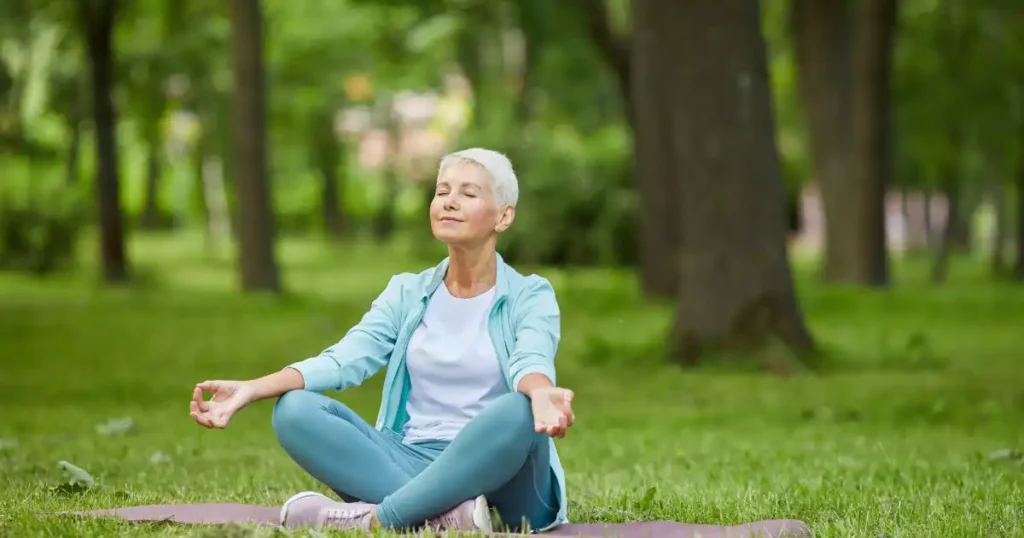Is Meditation for Seniors the Secret to Aging Gracefully?

Stress, Pain, and Memory Loss in Aging
Table of Contents
Aging brings challenges. The body slows down, joints ache, and memory becomes unreliable. Stress increases as life changes. Sleep problems, loneliness, and chronic pain become common.
Many seniors struggle with anxiety and depression. According to the National Institute on Aging, about 15% of adults over 60 suffer from mental health disorders. Cognitive decline also affects millions. The CDC reports that about 11% of seniors have some form of dementia. Here properly applying meditation for seniors can help.
Why Traditional Methods Often Fail
Medication side effects can be problematic, but doctors prescribe them. Drugs that cause pain can make you sleepy. Dependency may result from taking sleeping drugs. Although therapy might be beneficial, it is not always available or economical.
Although physical activity is suggested in this way, not everyone is able to participate in demanding activities. Although they demand movement and flexibility, yoga and tai chi are helpful. Seniors need a low-effort, straightforward, and efficient solution.
Meditation for Seniors
One effective way to manage discomfort, increase attention, and lower stress is through meditation. There is no equipment needed. Either sitting or lying down might be used. Meditation increases emotional well-being, memory, and blood pressure, according to studies.
Harvard Medical School discovered that meditation reduces inflammation, which is connected to heart disease and arthritis as people age. According to UCLA research, meditation maintains brain health over time.
How Meditation for Seniors work
1. Reduces Stress and Anxiety
Meditation reduces the stress hormone cortisol. According to a Johns Hopkins University study, meditation lowers anxiety by 20%. Health issues, loneliness, or the death of a loved one can all cause stress in older adults.
Take five minutes to practice deep breathing if you’re feeling nervous. Shut your eyes, take a deep breath, and then gently release it. This small action soothes your thoughts.
2. Improves Memory and Cognitive Function
Meditation for Seniors for 12 minutes a day reported better memory and concentration, according to a study published in Frontiers in Aging Neuroscience. Gray matter is increased during meditation, supporting brain function.
Try a five-minute mindfulness meditation if you lose stuff or forget names. Pay attention to your breathing and stay in the here and now. This improves remembering and focus.
3. Eases Chronic Pain
Meditation alters the brain’s perception of pain. According to a Wake Forest University study, practicing mindfulness meditation can cut discomfort by 40%. The brain responds differently, making pain signals more tolerable even if they remain exist.
For instance, if you have arthritis, look around your body while closing your eyes. Feel the discomfort, but don’t fight it. Imagine yourself as an impartial observer. Suffering has been reduced by this.
4. Better Sleep Quality
Seniors also suffer from insomnia. By reducing brain activity, meditation facilitates better sleep. Seniors who meditated slept better than those who didn’t, according to a research published in JAMA Internal Medicine.
For instance, do some guided meditation before bed. You can relax by listening to a recording that features a soothing voice. The body gets ready for a good night’s sleep.
5. Boosts Emotional Well-being
Happiness-related chemicals dopamine and serotonin increase during meditation. According to a study published in Psychiatry Research, meditation minimizes the symptoms of depression.
Love-kindness meditation, for instance, can help you feel less alone. Shut your eyes and repeat, “May I be happy,” without talking. May I stay well. May I rest in peace. Next, give these wishes to other people. This creates feelings of well-being.

Simple Meditation Techniques for Seniors
1. Mindful Breathing
Take a seat in a comfy chair. Pay attention to your breathing. Take a deep breath through your nose. Slowly release the breath via your mouth. For five minutes, repeat.
2. Body Scan Meditation
Sit comfortable or lie down. Shut your eyes. From the feet to the head, concentrate on different body areas. Take note of any tightness and release it.
3. Guided Meditation
A soothing voice will lead you through relaxation as you listen to an audio recording. Guided meditation is available through a lot of free applications and YouTube channels.
4. Loving-Kindness Meditation
Repeat positive phrases about yourself and others. This helps build compassion and reduces loneliness.
5. Walking Meditation
Walk slowly in a quiet space. Pay attention on each step and the sensation of your feet touching the ground. This improves mindfulness and balance.
Tips for Making Meditation a Daily Habit
- Start small. Meditate for 5 minutes daily and gradually increase the time.
- Choose a quiet space. Reduce distractions for better focus.
- Use reminders. Set an alarm or link meditation to another daily habit.
- Stay patient. Results take time, but consistency is key.
- Join a group. Many community centers offer meditation for seniors.
A Simple Practice for a Better Life
Seniors who meditated improved their health and well-being in a simple and efficient manner. It minimizes stress, promotes sleep, regulates pain, and improves memory. Studies prove its advantages. It only takes a few minutes a day to live a more calm and healthy life. Give it a try now to observe the change.
RELATED POSTS
55 Impactful Grief Journal Prompts for Elders to Overcome Sadness
How Do Best Exercise Bikes for Seniors Enhance Cardiovascular Health?
Explore the Top 10 Exciting Social Activities for Seniors
Frequently Asked Questions about meditation for seniors
Is meditation good for seniors?
Indeed, meditation benefits elders by lowering stress, boosting sleep, managing pain, and increasing memory. Research indicates that it improves mental and physical health by lowering cortisol levels while improving brain function.
How do seniors start meditating?
Seniors might begin with basic breathing techniques. Close your eyes, choose a comfortable seat, and concentrate on taking deep, calm breaths. Start with five minutes a day and work your way up to longer periods. Apps for guided meditation can be beneficial as well.
Can meditation improve memory in old age?
Meditation does appear to improve memory and focus by increasing gray matter in the brain, according to study. According to a UCLA study, regular meditation slows down the aging process of the brain and preserves cognitive function.
What type of meditation is best for seniors?
For elders, guided meditation, body scan meditation, and mindful breathing are excellent practices. Loneliness is decreased and emotional well-being is increased with loving-kindness meditation. Balance and mindfulness are benefited by walking meditation.
How long should a senior meditate daily?
Even ten to fifteen minutes a day of meditation can be beneficial for seniors. Practice on a regular basis is essential than duration. Consistency can be maintained by starting with brief sessions and progressively extending them.
Can meditation help with chronic pain?
Meditation does change how people perceive pain. mindfulness meditation lowers pain by 40%, according to a Wake Forest University study. It works by promoting relaxation and diverting focus from discomfort.
Does meditation help seniors sleep better?
Yes, by lowering stress and calming the mind, meditation improves sleep. According to a research published in JAMA Internal Medicine, seniors who meditated reported having less sleeplessness and higher-quality sleep.
Are there meditation apps for seniors?
Yes, seniors can participate in guided meditations with applications like Calm, Headspace, and Insight Timer. They offer simple instructions, meditations centered around sleep, and relaxing methods.
Can meditation reduce anxiety in seniors?
Indeed, cortisol and other stress chemicals are reduced by meditation. Meditation helps elders manage their fears and emotional distress by lowering anxiety levels by 20%, according to research from Johns Hopkins University.
Is meditation safe for seniors with health conditions?
Generally speaking, meditation is safe. Both sitting and lying down are acceptable positions for this low-impact exercise. Seniors who are seriously ill, however, should speak with a physician before beginning.





